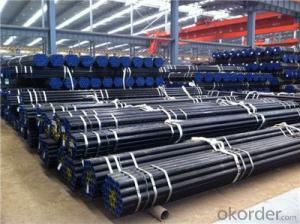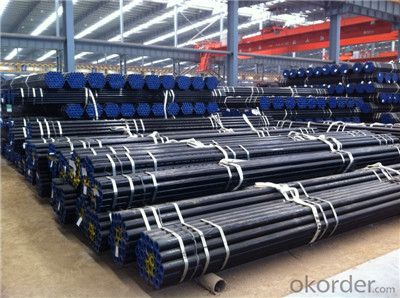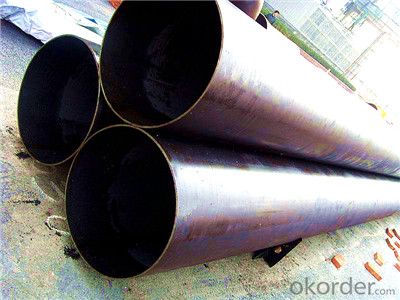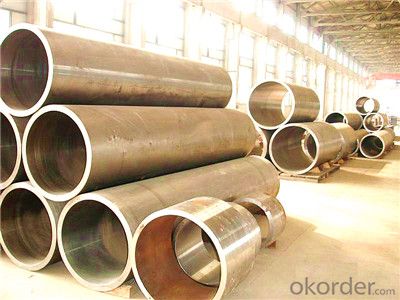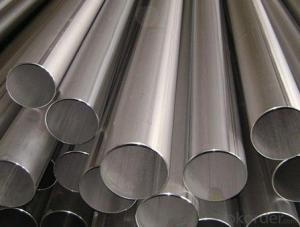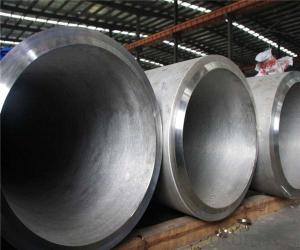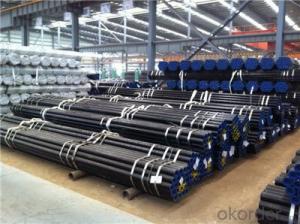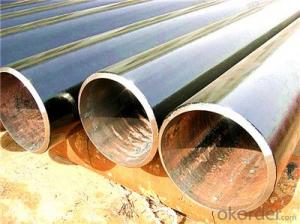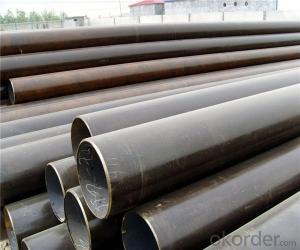CNBM seamless steel tubes hot selling with high quality and best price
- Loading Port:
- Tianjin
- Payment Terms:
- TT OR LC
- Min Order Qty:
- 50 m
- Supply Capability:
- 200000 m/month
OKorder Service Pledge
OKorder Financial Service
You Might Also Like
PRODUCT DETAILS
1.Structure of Seamless Steel Pipe Description:
A large amount of Seamless Steel Pipes is offered to the clients at cost effective rates. These pipes are extremely durable, resistant to corrosion and have high tensile strength. Our pipes are used in nuclear plants, power plants, refineries and construction industry across the country. Furthermore, we are capable of providing these seamless pipes to the clients in bulk quantity.
2.Main Features of the Steel Pipe:
• High manufacturing accuracy
• High strength
• Small inertia resistance
• Strong heat dissipation ability
• Good visual effect
•Reasonable price
3.Packaging & Delivery:
| Packaging Details: | Seaworthy packages, bundles wrapped with strong steel strip |
| Delivery Detail: | 15-30 days after received 30% TT |
4.Seamless Steel Pipe Specification:
| Standard: | GB, DIN, ASTM,ASME, ASTM A106-2006, ASTM A53-2007 |
| Grade: | 10#,20#, 45#, 16Mn |
Thickness: | 8 - 33 mm |
| Section Shape: | Round |
| Outer Diameter: | 133 - 219 mm |
| Place of Origin: | Shandong, China (Mainland) |
| Secondary Or Not: | Non-secondary |
| Application: | Hydraulic Pipe |
| Technique: | Cold Drawn |
| Certification: | API |
| Surface Treatment: | factory state or painted black |
| Special Pipe: | API Pipe |
| Alloy Or Not: | Non-alloy |
| Length: | 5-12M |
| Outer Diameter: | 21.3-610mm |
5.Product pictures
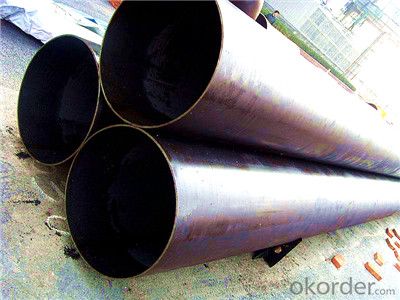
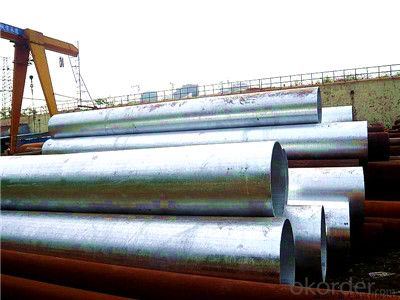
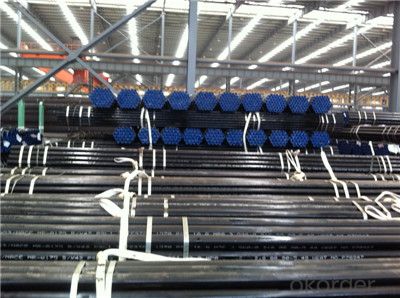
6.FAQ of Seamless steel pipe:
①How is the quality of your products?
Our products are manufactured strictly according to national and internaional standard, and we take a test
on every pipe before delivered out. If you want see our quality certifications and all kinds of testing report, please just ask us for it.
Guaranteed: If products’ quality don’t accord to discription as we give or the promise before you place order, we promise 100% refund.
②How about price?
Yes, we are factory and be able to give you lowest price below market one, and we have a policy that “ for saving time and absolutely honest business attitude, we quote as lowest as possible for any customer, and discount can be given according to quantity”,if you like bargain and factory price is not low enough as you think, just don’t waste your time.Please trust the quotation we would give you, it is professional one.
③Why should you chose us?
Chose happens because of quality, then price, We can give you both.Additionally, we can also offer professional products inquiry, products knowledge train(for agents), smooth goods delivery, exellent customer solution proposals.Our service formula: good quality+good price+good service=customer’s trust.
SGS test is available, customer inspection before shipping is welcome, third party inspection is no problem.
Any question, pls feel free to contact us !
- Q: How are steel pipes used in tunnel construction?
- Steel pipes are used in tunnel construction as structural elements to provide support and stability to the tunnels. They are commonly used in tunnel lining systems to create a strong and durable structure that can withstand the pressure and weight of the surrounding soil or rock. Steel pipes are also used for ventilation systems, drainage systems, and for carrying utilities such as water, gas, or electricity through the tunnel.
- Q: How are steel pipes used in the telecommunications network infrastructure?
- Steel pipes have a wide range of applications within the telecommunications network infrastructure. Underground cable conduits are one of the main uses of steel pipes in this industry. These conduits are responsible for safeguarding telecommunications cables from various external factors, including moisture, rodents, and physical damage. By providing exceptional strength and durability, steel pipes ensure the long-term protection of these cables. Furthermore, steel pipes are indispensable in the construction of telecom towers and antenna masts. These structures must possess robustness and resilience to withstand adverse weather conditions. Steel pipes offer the necessary strength, stability, and durability required for telecom towers to support antennas and other equipment. Additionally, their ease of assembly enables efficient deployment and maintenance of the network infrastructure. Additionally, steel pipes are crucial in the installation of fiber optic cables. Fiber optic cables transmit data at high speeds through the use of light signals. To ensure optimal performance, it is imperative to protect these cables from any external interference. Steel pipes serve as conduits for fiber optic cables, effectively shielding them from electromagnetic interference and other potential disruptions. To summarize, steel pipes play a vital role in the telecommunications network infrastructure. They are utilized for the installation of underground cable conduits, construction of telecom towers, and protection of fiber optic cables. The strength, durability, and versatility of steel pipes make them an ideal choice for guaranteeing the reliability and functionality of telecommunications systems.
- Q: How are steel pipes used in the construction of telecommunications towers?
- Steel pipes are commonly used in the construction of telecommunications towers as they provide the necessary structural support and stability. These pipes are used for the tower's main framework, ensuring its durability and ability to withstand various environmental conditions. Additionally, steel pipes are also used for cable management, allowing for the safe and efficient installation of telecommunications equipment and cables.
- Q: How are steel pipes coated for protection against external elements?
- Steel pipes are coated for protection against external elements through a process called pipeline coating. This involves applying a layer of protective material, such as epoxy or polyethylene, onto the surface of the steel pipes. The coating acts as a barrier, preventing corrosion and damage from external factors like moisture, chemicals, and UV radiation. This protective coating ensures the longevity and durability of the steel pipes, even in harsh environments.
- Q: How do steel pipes perform in extreme temperature variations?
- Steel pipes perform well in extreme temperature variations due to their high thermal conductivity and resistance to expansion and contraction. They are able to withstand both high and low temperatures without losing their structural integrity or experiencing significant changes in dimensions. This makes steel pipes suitable for a wide range of applications, including those in industries with extreme temperature conditions, such as oil and gas, chemical processing, and power generation.
- Q: How are steel pipes inspected for defects?
- Steel pipes are inspected for defects using various methods, including visual inspection, ultrasonic testing, magnetic particle inspection, dye penetrant testing, and radiographic examination. These techniques help identify any cracks, corrosion, or other defects in the pipes to ensure their structural integrity and prevent any potential hazards or failures.
- Q: Can steel pipes be used for underground fuel storage systems?
- Yes, steel pipes can be used for underground fuel storage systems. Steel pipes are commonly used for underground fuel storage due to their durability, strength, and resistance to corrosion. Additionally, steel pipes can be easily welded and sealed, ensuring a secure storage system for fuels.
- Q: How are steel pipes coated to prevent internal corrosion?
- Steel pipes are coated to prevent internal corrosion through a process called internal coating. This involves applying a layer of protective material, such as epoxy or polyethylene, to the inner surface of the pipe. The coating acts as a barrier, preventing the steel from coming into contact with corrosive substances in the fluid being transported, thus effectively reducing the risk of internal corrosion.
- Q: What are the different types of pipe fittings used with steel pipes?
- Some of the different types of pipe fittings used with steel pipes include elbows, tees, couplings, unions, flanges, and reducers.
- Q: What are the common factors affecting the lifespan of steel pipes?
- There are several common factors that can affect the lifespan of steel pipes. 1. Corrosion: Corrosion is one of the primary factors that can significantly reduce the lifespan of steel pipes. Exposure to moisture, chemicals, and harsh environmental conditions can cause the steel to rust and deteriorate over time. 2. Quality of materials: The quality of the steel used in manufacturing the pipes plays a crucial role in determining their lifespan. Higher-quality steel with better resistance to corrosion and other forms of degradation will generally have a longer lifespan compared to lower-grade materials. 3. Installation and maintenance practices: Proper installation and regular maintenance are essential for ensuring the longevity of steel pipes. Improper installation techniques, such as inadequate support or improper alignment, can lead to premature failure. Similarly, neglecting routine maintenance, such as cleaning and inspection, can accelerate the degradation process. 4. Operating conditions: The operating conditions to which steel pipes are exposed can also impact their lifespan. Factors such as temperature, pressure, and the type of fluid or gas being transported can all affect the integrity of the pipes. Extreme conditions, such as high temperatures or corrosive substances, can significantly reduce the lifespan of steel pipes. 5. Mechanical stress: Excessive mechanical stress, such as vibration, impact, or heavy loads, can weaken steel pipes over time. This stress can lead to cracking, deformation, or even complete failure if not properly managed or accounted for during the design and installation process. 6. Environmental factors: The surrounding environment can have a significant impact on the lifespan of steel pipes. Exposure to harsh weather conditions, such as extreme temperature variations or frequent freeze-thaw cycles, can accelerate the deterioration process. Additionally, the presence of pollutants or aggressive substances in the surrounding soil or water can also contribute to the degradation of steel pipes. In summary, the lifespan of steel pipes can be affected by factors such as corrosion, material quality, installation and maintenance practices, operating conditions, mechanical stress, and environmental factors. By considering and addressing these factors, it is possible to extend the lifespan of steel pipes and ensure their durability and reliability.
Send your message to us
CNBM seamless steel tubes hot selling with high quality and best price
- Loading Port:
- Tianjin
- Payment Terms:
- TT OR LC
- Min Order Qty:
- 50 m
- Supply Capability:
- 200000 m/month
OKorder Service Pledge
OKorder Financial Service
Similar products
Hot products
Hot Searches
Related keywords
